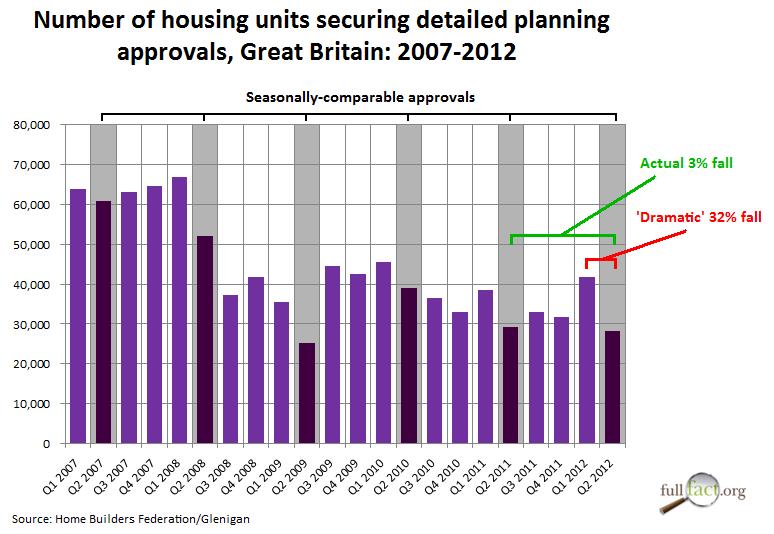Has there been a 'dramatic' slump in housing planning approvals?
"Planning permission approvals for new homes have dramatically slipped by almost a third, suggesting government measures to increase housebuilding and boost the construction industry may have failed to take hold."
Independent, 10 September 2012
"Sharp fall in approvals for new homes"
Financial Times, 10 September 2012
Earlier this week the Independent and the Financial Times threw a considerable bucket of cold water over the Government's housing strategy.
According to the latest figures, they claimed, planning permissions have fallen "dramatically" or "sharply" by 32 per cent since the first quarter of 2012.
But are the stats really so bleak?
Analysis
Full Fact has already done a number of factchecks on housebuilding, finding in June that the Housing Minister's own claims about a "rapid and dramatic" increase in affordable homes starts left much to be desired.
This week's figures concern housing 'planning permissions', which are recorded by Glenigan construction analyist agency. Figures are compiled and published quarterly by the Home Builders Federation (HBF). The latest such statistics are avaialable for the second quarter of 2012.
In the second quarter of 2012, Glenigan recorded 28,312 residential planning approvals in Great Britain. This compares to 41,874 planning approvals in the first quarter of 2012.
This indeed works out as a 32% fall in approvals. But is this 'dramatic'? An obvious way of finding that out is by comparing it to recent falls.
However, after contacting the HBF for more details, they actually told us that the data is not seasonally-adjusted. In other words, we shouldn't even be comparing two consecutive quarters, because certain times of the year might consistently see higher or lower approvals than others.
When data isn't seasonally-adjusted, we need to look at the second quarter of 2012 compared to the second quarter of 2011. Doing this reveals that the latest set of data isn't revealing a 32% fall on the comparable previous period, but a 3% fall:

In fact, as the graph shows, the first quarter of a year has consistently seen higher planning approvals than the second quarter since 2007, although granted that the 2012 drop is greater than any of the previous Q1-Q2 falls.
So there is certainly a "disappointing fall" (the words of Glenigan's Economics Director) but we shouldn't be at all surprised that there is a fall in the first place - only by the relatively large scale of it.
In fact, as one of our readers pointed out in a suggestion, over 10,000 of the quarterly 'dramatic' fall of 13,500 is accounted for by the London region. As the HBF confirmed to Full Fact, London typically sees a greater variation in planning approvals because planning projects in London tend to be larger than in the rest of the UK. Hence one or two failed approvals have a much larger effect on the overall number of housing units being approved.
The HBF also pointed out there could be an 'Olympics effect', since projects related in some part to the Olympics obtaining planning permission at the start of 2012 may well have inflated the first quarterly figures - further exaggerating the quarterly fall.
This doesn't change the fact however that the headlines this week are likely to have exaggerated the state of planning falls by comparing the quarterly figures. A far more useful proxy is to take a comparable period in 2011. This shows not a 32% fall but a 3% fall in planning permission approvals.
Conclusion
It's worth bearing in mind that, in 2007, the Government set a target of 240,000 additional homes per year by 2016 in order to meet the UK's housing need. That's 60,000 per quarter - a level in line with the planning approvals for 2006 and 2007 but far above recent figures for 2011 and 2012. So we shoudn't be in any doubt that planning approvals are at a concerningly low level compared to the pre-recession figures.
However, reporting that planning permission approvals have fallen "dramatically" and "sharply" doesn't fairly reflect what the figures are actually saying. Using the most recent comparable time period - the second quarter of 2011 - there has only been a 3% fall in approvals - not the 32% implied by the articles.